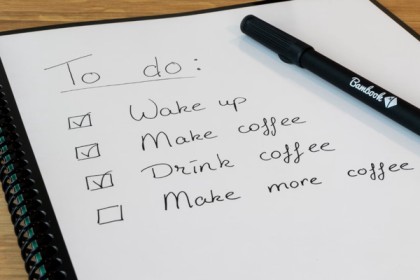Table of Contents
Describe Something You do To Help You Work Or Study

Cue Card
You should say:
- What it is
- How you do it
- When you do it
- And explain how you feel about the method
Sample Answer 1
One effective study method that greatly aids my concentration and productivity is the use of mind mapping. Mind mapping is a visual technique that involves creating a diagram to represent ideas, concepts, and their connections in a non-linear and visually appealing format.
I initially learned about mind mapping during my high school years through a study skills workshop. The workshop introduced various techniques for effective learning. and mind mapping stood out as a method that appealed to my visual learning style.
I utilize mind mapping primarily when preparing for exams or tackling complex subjects. It allows me to break down information into key concepts, making it easier to understand relationships and identify crucial details. I typically create mind maps using software on my computer or by hand, depending on the situation and available resources.
The method is most effective when I’m faced with a large amount of information or when I need to grasp complex topics quickly. I find it especially helpful during revision sessions before exams or when working on research projects.
In terms of how I feel about the method, I am very positive. Mind mapping has become an integral part of my study routine due to its versatility and effectiveness. it not only enhances my comprehension of subjects but also makes the learning process more engaging and enjoyable. The visual representation of information aids in memory recall, and the flexibility of mind mapping allows me to customize my study approach based on the specific requirements of each subject.
In conclusion, mind mapping has proven to be a valuable tool in my academic journey, aiding me in understanding complex topics and boosting my overall study efficiency.
Sample Answer 2
One thing I do regularly to help me work or study is creating a daily to-do list. It may sound simple, but it’s an incredibly effective tool for staying organised and managing my tasks efficiently. Every morning, I sit down and jot down all the things I need to accomplish for the day. This helps me prioritise my tasks and ensures that ! don’t forget anything important. As I complete each task, I check it off the list, which gives me a sense of satisfaction and helps me keep track of my progress.
To learn this method, I initially came across it while reading a book on productivity. I was intrigued by the idea of using a to-do list to stay organised, so | decided to give it a try. I started by using a simple pen and paper, but as I became more comfortable with the process, I started exploring digital options. I discovered various productivity apps that allow me to create and manage my to-do lists on my phone or computer. Additionally, I learned different techniques for breaking down tasks and setting realistic deadlines.
I usually create my daily to-do list in the early mornings. I find that this is the time when my mind is fresh and focused, and there are minimal distractions around. It’s a peaceful environment that allows me to plan my day ahead and set clear goals. By starting my day with a well-organised list, I feel more prepared and motivated to tackle my tasks.
I absolutely love this method of using a daily to-do list. It has proven to be incredibly effective and efficient for me. Not only does it help me stay organised and on top of my work, but it also gives me a sense of accomplishment as I check off each task. It’s a visual representation of my progress and motivates me to continue working hard. Overall, I consider this method to be a valuable tool in my work and study routine.
Part 3
1. Do you think everyone’s routine is different?
Definitely! People have different schedules, responsibilities, and preferences, which influence their daily routines. What works for one person may not work for another, each individual has their own unique circumstances and factors that shape their daily activities. Therefore, it is crucial to take into account these diverse aspects when designing a routine that is tailored to meet individual needs and goals.
2. Which jobs need a morning routine?
Many jobs can benefit from having a morning routine, especially those that require focus, productivity, and preparation. Jobs involving planning, strategizing, or creative thinking often benefit from starting the day with a clear mind and a structured routine, such as executives, entrepreneurs, teachers, and scientists. Oh, yes, us, students, morning time is precious for students to study, especially learning something that need to be recited.
3. Is a daily routine important?
Of course! Daily routine is a set of regular and repeated actions, or activities that are performed everyday. It provides a sense of structure, organization, and helps in managing time efficiently in daily life. It can also create a sense of stability and control, especially during busy or uncertain periods. Therefore, having a daily routine can be important for maintaining productivity, reducing stress, and achieving goals.
4. How do people organize their routines after getting up in the morning and after work?
After waking up in the morning, people usually begin their routine by taking care of essential tasks such as personal hygiene, breakfast, and maybe squeezing in some exercise. They might also take a moment to plan out their day, set some goals, and go over their schedule. After finishing work, people often unwind by doing something they enjoy, spending time with loved ones, pursuing hobbies, or reflect their day to clarify gaining and loosing in the day and getting things in order for the following day.
5. Do you think children need to have a routine too?
Yes, having a routine is important for children as it provides them with a sense of security, predictability, and discipline. A routine helps children develop good habits like healthy sleep patterns, balanced meals. And, having a routing can teach children the importance of time, help them to manage their time effectively in regular study or playtime.
6. Do you think routine is important for companies?
Yes, routine and structure are important for companies. It ensures smooth operations, productivity, and goal achievement. As I know, companies often establish routines on meetings, project management, and regular reporting. So, a framework can be structured for employees to work efficiently and collaborate effectively as established routines.
Some IELTS Speaking part 2 cue-cards you may like :
- IELTS Speaking Part 1 From January to April 2024
- IELTS Speaking Part 2 From January to April 2024
- (2024) Describe Something You Do That Can Help You Concentrate On Work Or Study
- (2024) Describe a Job That you Do Not Like To Do In The Future
- (2024) Describe a Time When You Helped Someone
- (2024) Describe An Unusual Holiday/ Vacation You Had
- Describe An Occasion when You Used a Map (e.g a Paper Map, An Electronic Map) That Was Useful
Credits
Image : Photo by Thomas Bormans on Unsplash


